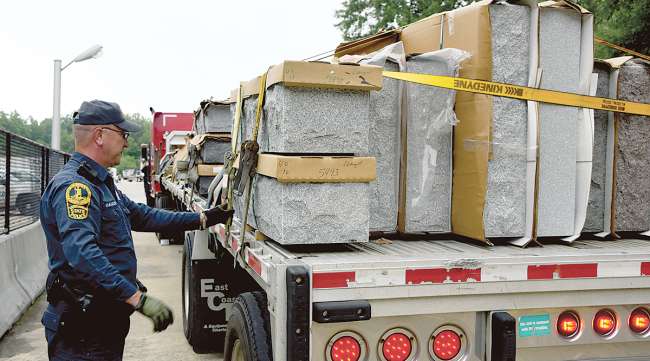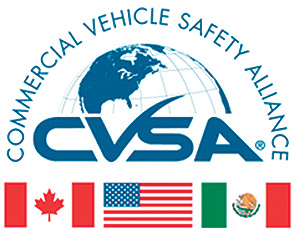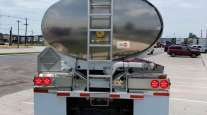Senior Reporter
CVSA's International Roadcheck Rescheduled for Sept. 9-11

[Stay on top of transportation news: Get TTNews in your inbox.]
The postponed International Roadcheck event has been rescheduled for Sept. 9-11, the Commercial Vehicle Safety Alliance announced Aug. 10.
CVSA officials postponed the event in March due to the COVID-19 pandemic.
“Although the coronavirus pandemic understandably shifted priorities and personnel during the spring, the commercial motor vehicle law enforcement community has reasserted its focus on the roadside inspection program and enforcement duties,” CVSA President Sgt. John Samis with the Delaware State Police said in a statement. “Jurisdictions are nearly back to their pre-pandemic capacity with a strengthened concentration on identifying and removing unfit vehicles and drivers from our roadways using federal safety standards and the out-of-service criteria.”
CVSA's previously postponed International Roadcheck has been scheduled for Sept. 9-11. This year’s focus is on the driver requirements component of a roadside inspection. https://t.co/3drRsglmGu pic.twitter.com/dD9caGJFja — CVSA (@CVSA) August 10, 2020
International Roadcheck is a 72-hour stepped-up visibility inspection and enforcement initiative by CVSA-certified inspectors in Canada, Mexico and the U.S., conducting motor vehicle and driver inspections at weigh or inspection stations, designated fixed locations or as part of roving mobile patrols.
During the three-day time frame, law enforcement personnel inspect commercial motor vehicles for compliance with federal regulations and utilize the North American Standard Out-of-Service Criteria to identify critical inspection item violations.
Each year, International Roadcheck places special emphasis on a category of violations. This year’s focus is on the driver requirements component of a roadside inspection. Of the approximately 3.36 million inspections during 2019, 952,938 driver violations were discovered, of which 199,722 were out-of-service conditions.

For the driver portion of an inspection, the inspector will collect and verify the driver’s documents, identify the motor carrier, examine the driver’s license, check record of duty status and review periodic inspection reports. If applicable, the inspector will check the Medical Examiner’s Certificate, Skill Performance Evaluation Certificate and the driver’s daily vehicle inspection report. Inspectors also will check drivers for seat belt usage, illness, fatigue, and apparent alcohol or drug possession or impairment.
Drivers found to be operating without the proper driver credentials, in possession of or under the influence of drugs or alcohol, operating while ill, fatigued or showing other signs of impairment, or in violation of hours-of-service rules may be placed out of service.
The vehicle portion of an inspection includes checking critical vehicle inspection items such as brake systems, cargo securement, coupling devices, drive-line/drive-shaft components, driver’s seat (missing), exhaust systems, frames, fuel systems, lighting devices, steering mechanisms, suspensions, tires, van and open-top trailer bodies, wheels, rims and hubs, and windshield wipers.

Connectivity is changing trucking today and into the future, including how it could enable electric and self-driving trucks. Host Seth Clevenger talks with two experts from Penske Transportation Solutions, Bill Combs and Samantha Thompson. Hear a snippet, above, and get the full program by going to RoadSigns.TTNews.com.
If an inspector identifies critical inspection item violations, the inspector will place the vehicle out of service, which will require it to be restricted from traveling until the violations are corrected.
In the U.S., commercial motor vehicle inspections are conducted to check for vehicle and driver compliance with the Federal Motor Carrier Safety Regulations. In Canada, the standards are based on the National Safety Code and various provincial/territorial regulations, while in Mexico, Normas Oficiales Mexicanas are the commercial motor vehicle regulations and standards.
During International Roadcheck, inspectors primarily conduct the North American Standard Level I Inspection, a 37-step procedure that includes two main inspection categories and an examination of driver operating requirements and vehicle mechanical fitness. A third category, hazardous materials/dangerous goods, may also be part of a Level I Inspection.
International Roadcheck is a CVSA program with participation by the Federal Motor Carrier Safety Administration, the Canadian Council of Motor Transport Administrators, Transport Canada, and the Secretaríade Comunicaciones y Transportes, or Ministry of Communications and Transportation of Mexico.
Want more news? Listen to today's daily briefing:
Subscribe: Apple Podcasts | Spotify | Amazon Alexa | Google Assistant | More




